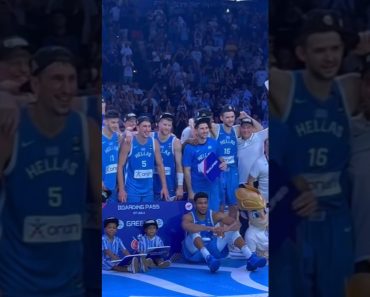The number one. The Alpha. Our thesis statement today: everything starts there. When you talk about the eleven, you have to start at one. “With the No. 1 beneath the posts…”, the announcer used to say, back when every number defined a position. And the “1” was reserved for the goalkeeper. Without fail. The philosophers of the Football School turned the ‘one’ into an ‘ace’: “A great team starts with a great goalkeeper.” With that lone wolf of the penalty area. With the thick gloves, the full kit, and zero tolerance for errors. But keeping the Olympiacos goal wasn’t always an easy task. It’s a whole lot of responsibility. And many worthy keepers buckled under the pressure. Others withstood it. But there was a select group. Elite keepers whose exploits have been written in gold in the Book of Red. First and foremost among them: Achilleas Grammatikopoulos (1908-2008).
Taking over from Kostas Kleidouchakis (the first goalkeeper in the Club’s history, 1925-30), he kept the Olympiacos goal for 18 straight years (1928-1944). A mainstay of the club’s early rise to the giddy heights, he was there for its first five Championship wins. They called him “Zamora”. After the legendary Spanish portero of the… flat cap era. And he was a real class act. A true working-class gentleman of Piraeus. Both on the pitch. And off it. Like the time (in ’34), when he replied to Mussolini’s offer to stay in Milan (Ambrosiana—today’s Inter), after his great performance in a World Cup qualifier between Italy and Greece, with the inimitable “As a Greek, I watch over the flag of Greece”.
Then came Savvas (1935-2020):
“If the idea of a ‘foot soldier of Olympiacos’ ever took on human form”, the Club wrote in its official “farewell”, “it would be his”. Precisely.
It’s 1953 when he arrives in the Port, Stathis Kourouklatos (1946-55) and Kostas Karapatis (1951-57) are both regulars in the Reds’ goal. But from ’55 on, he’s heading for the stratosphere: 5 Championships, 5 Cups, the “ace” of the legendary team of the ’50s, of Olympiacos’ first European years and the Greek national team (12 appearances). And now for something… completely different! A well-educated Athenian who looked like a film star and spoke three languages—well-off, bourgeois, with a degree in Pharmacology and a “Vauxhall Velox” sports car.

Panagiotis Kelesidis leaps to block a penalty kick in the … black & white era of the 1970s.
Then came Stathis Tsanaktsis (1960-64) and Paraschos Avgitidis (1962-67, the ace up Bukovi’s sleeve), who both did a fine job at keeping the ball out of the net through until the late 60s. But after him, for five long years, despite a constant stream of keepers trying out in the Olympiacos goal (Vallianos, Kois, Xarchakos, Tzortzis, Liadelis, Mylonas, Karypidis and others), none of them stuck. Until Goulandris came along, that is. And the Argentinian Alberto José Poletti (1972), the first non-Greek—excepting Cypriots—on the team. A huge name once (he’d once commanded a 1.7 million transfer fee in his prime). But now limping his way towards retirement. The age of Panagiotis Kelesidis was just beginning. The team was awash with talent, especially during its three years with Captain Goulandris at the helm (1972-75), and with titles: 3 Championships and 2 Cups.
When you said “goalkeeper” you meant “Sarganis”! The man with reflexes of … six hands. Greek football “Phantom”!
The ‘Phantom’
Valuable back-up was provided during these years by another active international: Lefteris Poupakis (1973-78). Then Christos Arvanitis (1978-82) took his place in goal. An outstanding player, especially between the posts, he played a crucial role in Olympiacos taking the title in the League’s first professional season (1980, see the barrage of shots he saved against Aris). But there was once ever one “Phantom”: Nikos Sarganis, the Red legend (1954-2024)…
Was he the GOAT? Many would say “Yes”. Everyone else would say “probably”. What’s certain? His five years at the Piraeus club (1980-85 / 3 Championships, 1 Cup, in a team noted for its defense and its goalkeeping above all), in the wake of the miracles he performed with Kastoria… (winning the Cup ’80, keeping the score at 0-0 in Faliro in ’79, with two penalty saves), made his name synonymous with ‘goal keeper’ for the teenage fans of the time—who are now 50-somethings! When you said ‘goalkeeper’, you meant ‘Sarganis’! What was so great about him? Everything. But those incredible reflexes most of all, which had Piątek talking about “a goalkeeper with six hands” (during his legendary debut with the Greek national team against Denmark in 1980). 1984, Faliro, against the Cretan OFI. Petrakis sends in the cross. A diving header from Vlastos. The ball flies past Sarganis and while the goal seems inevitable, he somehow reaches back, his body following him, and blocks the shot! A feat that was followed by two seconds of absolute silence. And Tsirimokos’ historic fair play kiss. The ultimate image of pure footballing greatness…
His move to Panathinaikos in ’85, the result of a disagreement with Daifas (“he underestimated me”) and some unfortunate reactions on his part would tarnish his relationship with a good part of the Olympiacos fans. In fact, it would take time, explanations, an apology and his sincere “I’ve been Olympiacos since I was a kid” made after he retired, just short of 40, for the majority to soften their hostile stance. The main cost, however, was borne by the team. He cast a long shadow. A lot of men tried to fill his foots. And of every ilk: goalies who were already in the squad (Papamichail), familiar faces (Arvanitis), internationals (Moukeas, Plitsis), good First Division players (Skounas, Mirtsos, Tochouroglou), foreigners – big names (Kazmierski), rising stars (Molakidis). But none of them could, for whatever reason. Until the ‘stone walls’ that is, because Ilias Talikriadis (1987-94, he also played for Greece) and Alekos Rados (1988-98, great skills but plagued by bad luck) would prove more long-lasting in the Olympiacos goal. Plus Fotis Strakosas (1993-97). They all had something to offer. Each with their strong points and weaknesses… their ups and downs. But a feeling of real security would return, surprisingly, with a… youngster, 19 years old, a child of the academies and… the stands (a Piraeus local), who’d just finished his apprenticeship with second-division Proodeftiki: Dimitris Eleftheropoulos.

Ele: one in a million
Summer of ’96, the rebirth. Olympiacos starts off the season in third place. Come autumn, though, Strakosa has lost his form and Rados is injured (before the Iraklis game) and, to cap it all, suspended (against Athinaikos). Bajević takes a risk. “Ele” proves him right to have done so: two doubles, 1-0. The final whistle blows! Crucial in the first championship after the departure of the “stone walls” (1997), plus 6 in a row through to 2003, he was amazing (having missed the 1997-98 season, due to injury) in the ’99 double and the magnificent run that took Olympiacos into the last eight of the Champions League (second best team and… very best goalkeeping: the triple, when he kept out shots by Fonseca, Deschamps and Inzaghi in the quarter-final against Juventus) leading to his stock soaring and a place on the national team. Until… Conte’s goal in the return leg. Olympiacos were out a hair’s breadth away from the semis…
And it costs him. It messes up his head – “I didn’t go out for a year”. Combined with the start of a barrage of rumors and speculations plus injuries, from 2000 onwards… the old instability is back. Everything is up and down. Everything. His place—he’s on the bench as often as he’s in goal (replaced by Georgiou, Koubek, Katergiannakis…). His relationship with the fans; from his being booed in the match against Liverpool and his resigning as captain (2000, UEFA), to his being hailed as a hero in Manchester (2001, keeping a clean sheet for 80 minutes with a broken finger, saving Van Nistelrooy’s penalty) and from those heights, back down again (2003-’04): Torino (0-7), the People’s Courts ruling against him in the game against PAOK (January). The swan song. Next step: abroad. He earned it. In any case, History can’t be unwritten. It just sets space aside, wisely, for the… better things that are (always) to come. Because the spark sometimes returns when the hair’s turned grey…
If the 2004 Euro epic shook the world, Antonis Nikopolidis’ move from Panathinaikos to the Port was (apart from the acquisition of Rivaldo) the most powerful aftershock! A tough decision. For the Olympiacos fans, no matter if “they thought I was finished”. For the Greens, to say goodbye to a much-loved player who had been integral to their team for 15 years (1989-2004) and countless Red-Green derbies. In practical terms? Yes, he was the MVP keeper in the Euros; yes, he had years of excellent service with Panathinaikos, but at 33, was he the best choice?
He developed into something infinitely more than that. A fine professional who gave his best over multiple seasons (in fact, the seven most successful seasons in the Club’s history: 6 Championships, 4 Cups, and the epic final with… 34 penalties, in ’09, against AEK Athens, which the Reds won thanks to Nikopolidis. A seminal figure, he has most definitely earned his place in discussions about the top all-time keepers. He not only won over the difficult fans at the Karaiskakis stadium. He gave them no option but to offer him their sincere respect—indeed, reverence—and to set the cliches of Green-Red rivalry aside. His last game in the Red jersey: 17 April 2011, against Larissa. All those who were there know what a treat that was!

Roberto and the rest
We’re into the final straight (and the Marinakis era). Foreign keepers dominate the starting line-up (with the exceptions of Kapino, Gianniotis and Paschalakis). From Megyeri, Pardo, Proto, Vaclik, to Leali and… Costanzo: no comment!
One stands out: the Northern Irishman, Roy Carroll (2011-12). “Old” they called him (he was 36), “from OFI” they said, “with issues” they said, though they were from way back in his Manchester United days. They said a lot… But Carroll and Olympiacos were made for one another, even if they only got to play 34 games together. Who could ever forget the matches against Rubin (Europa)? Or his leg in a pot… There was one other: the Portuguese José Sá (2018-21). Value for money personified. Via Martins, from being out of action, on loan from Porto… to the Portuguese national team and Wolves, for €9 million! Above all else, though, his commanding presence on the field.
Roberto Jiménez Gago. A Spaniard (2013-16). He arrived without fanfare, on loan from Atletico. But evolved into… an idol, a leader! His time at Olympiacos was crowned by some mythic nights in the Champions League – Benfica: yes, you heard right! Piraeus loved him. And he loved the fans and the port city back: “There hasn’t been a day at this club when I haven’t felt proud to be here.”
Which is almost certainly what the club feels about its latest crop of talent: because some future tribute to the Legend’s goalkeepers will surely start with this name: Tzolakis Konstantinis…








